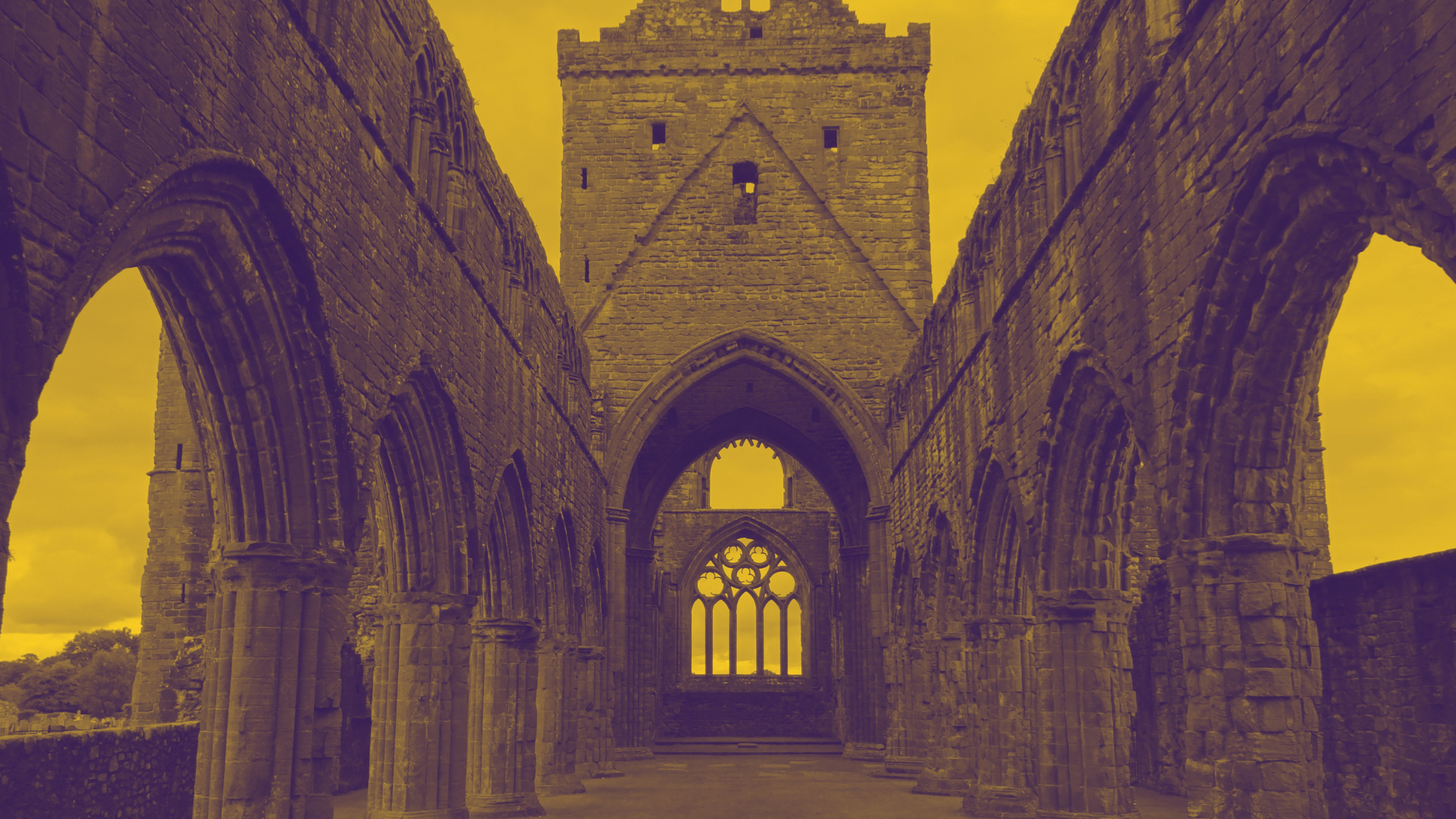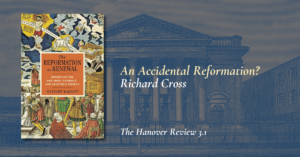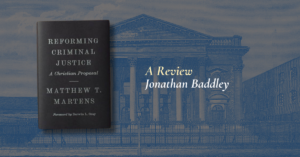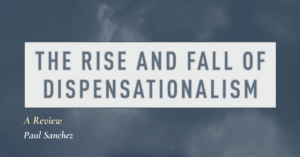John of Salisbury nearly ten centuries ago said that, “Bernard of Chartres used to compare us to dwarfs perched on the shoulders of giants. He pointed out that we see more and farther than our predecessors, not because we have keener vision or greater height, but because we are lifted up and borne aloft on their gigantic stature.”[1] Salisbury, even as a medieval humanist and bishop of Chartres who lived from 1115-1180, speaks to us today.[2] His point is that we gain knowledge and understand the world around us because of the efforts of those who have gone before us.
But what happens if we ignore those who have come before? To ignore voices from the past is to be guilty of chronological snobbery.[3] It reveals our hubris in assuming that we have no need for the past riches of the Christian inheritance. Furthermore, what if the evangelical yearning for a deep sense of transcendence—despite our twenty-first-century entertainment-driven, fad-based Western society—could be found in such historical connectedness? History and tradition are imperative for our understanding of Christian doctrine and righteous living. And not only are they imperative, but they speak to a serious need in the life of the modern church. How do people living today know the content of the “…faith that was once for all delivered to the saints?” (Jude 3) unless this truth has been revealed, entrusted, and passed down to them through the ages? The theological discipline of historical theology helps us to do just that—to stand on the shoulders of giants as we pass on and contend for the faith that was once for all delivered to the saints. Churches of our day must engage in historical theology not only because it is wise and timely but because it is necessary.
What Is Historical Theology?
Before offering five reasons why historical theology is wise, timely, and necessary for the church today, a working definition of historical theology is in order as, perhaps, the term itself is foreign to the reader. The late Jaroslav Pelikan once stated that historical theology is what the church “believes, teaches, and confesses as it prays and suffers, serves and obeys, celebrates and awaits the coming of the Kingdom of God.”[4] Pelikan’s lucid definition underlines the weightiness and applicability for the church today of what is at the heart of the discipline of historical theology, namely the study of how the church of the past interpreted Scripture and formulated doctrine.[5]
Although its own discipline, it is also related to several other theological disciplines, namely, exegetical theology, biblical theology, systematic theology, and practical theology.[6] Exegetical theology seeks to find the meaning of the biblical text. Biblical theology[7] articulates the progress of redemptive history and traces the common themes found throughout Scripture as a whole. Systematic theology is probably the discipline with the most familiarity. Systematic theology expresses “what Christians and churches are to believe, do, and be today in accordance with all the teaching of Scripture.”[8] With these definitions in place, we can see that historical theology assists exegetical, biblical, and systematic theology by informing each of these three disciplines with wisdom from past ages.[9] The aim of all these disciplines then is what is known as “practical theology” — the Word ministry of the church that speaks into the everyday lives of the people of God today. And this is what creates the wise, necessary, and timely connection between the past and the present. Practical theology is most faithful when it is rooted in historical theology.
Since historical theology is the academic discipline that seeks to explain the development and change of Christian doctrines over time,[10] its aim is to reflect the wisdom of the church of the past for aiding the ministries of the church today. To be clear, when evangelicals speak of the development or growth of doctrine over time, we mean greater clarity and further nuance as opposed to innovation. The truths of Scripture and its divine author do not change. Church tradition serves as a handmaiden to the Word of God, therefore historical theology plays a pivotal but helping role in the life of the church.[11] Attentiveness to, and absorption of, the accumulated wisdom from over 2,000 years of church history is of great advantage to Christ’s bride as she seeks to live faithfully in a hostile world. Theologians and pastors do themselves a disservice if they approach a biblical text or theological question as if they are the first to ever do so. Historical theology broadens and adds depth to exegesis. It adds a most welcome conversation partner in to our interpretation of the Scripture guarding and guiding us so that we may not err.
5 Ways Historical Theology Impacts the Church Today
The first way that historical theology impacts the church today is that all of the legwork of the most essential tenets of the Christian faith has already been done. The church has no need to reinvent the wheel and exercises wisdom in not doing so. Certain ministry contexts may, and often do, demand interaction and application with particular doctrines in a variety of ways, but the foundation of truth has already been laid. Contemporary expression of historic doctrines comes by way of “a meditation on, and even more importantly a meditation through, earlier stages of historical expression.”[12] When we meditate through doctrinal formulation from the past, we transition from mere cognitive comprehension of information or blind acceptance of church tradition. Instead, we move on to a more nuanced Spirit-guided wisdom tour. The voices we find there are imperfect, like our own, but Lord willing, this experience exposes us to scripturally rooted doctrinal truths communicated by tested travelers in such a way that it changes our values and our attitudes, confirms or causes us to reevaluate our convictions, and offers clarity and vocabulary for a more humble and informed present-day application of timeless truths. Take the doctrine of the incarnation, for example. In their own doctrinal formation, pastors and theologians today are heavily dependent upon the conclusions expressed at the Council of Chalcedon in 451 and the Second Council of Constantinople in 553. Any modern expression of this cardinal doctrine that uses terms like, “two unchanging natures, divine and human, united in the person of Jesus Christ,” is relying on the work of the early church.[13]
The task of pastors and theologians today is to reflect on these classic doctrines and expound upon them for this generation with greater clarity and sensitivity to their individual contexts while holding fast to Scripture alone as the ultimate authority. The Bible alone is sufficient for doctrine and holy living, but it must be read, interpreted, explained, and applied. Therefore, wisdom points Christians toward a hermeneutic that values and reads Scripture in light of the church’s doctrinal and interpretive tradition while maintaining the utter uniqueness and supremacy of the biblical text itself. This understanding of the Reformation doctrine of Sola Scriptura helps the church to be confessional[14] rather than strictly “biblicist.”[15] This in turn allows her to see more accurately that Sola Scriptura was never intended to be used to deny what Scripture clearly teaches, that the church is the “pillar and buttress of the truth” (1 Tim 3:15; cf. Heb 13:7). God has authorized and gifted the church with many great teachers throughout history that we would be foolish not to consider (cf. 2 Tim 2:2; Eph 4:11–12).
Second, historical theology aids the church in her ongoing necessary endeavor to distinguish sound doctrine from heresy, truth from error (1 Tim 1:10; 2 Tim 4:3; Titus 1:9; 2:1). Daniel Williams argues, “If the aim of contemporary evangelicalism is to be doctrinally orthodox and exegetically faithful to Scripture, it cannot be accomplished without recourse to and integration of the foundational tradition of the early church.”[16] The hope of studying doctrinal development throughout the ages is to not stumble into the same heretical snares from the past but to rightly recognize orthodox belief. Vincent of Lerins called it, “that faith which has been believed everywhere, always, by everyone.”[17] Again, consider the doctrine of the incarnation and the vocabulary developed regarding the person of Christ by the early church councils. The heretical teachings of Nestorius and Eutyches in the fifth century demanded the Council of Chalcedon.[18] More needed to be said than what took place at Nicaea in 325 and Constantinople in 381 because the person of Christ was under attack. Skepticism and controversy surrounding the person of Jesus Christ are perennial issues in Christian theology that spring up in every generation. Historical theology is necessary because historical errors about who Jesus is lead people away from saving faith. Historical theology connects the church’s thinking about specific theological heresies to beliefs commonly held today that the church might combat error with truth in love.
Third, historical theology gifts the church with inspiring examples of faith, piety, perseverance, commitment, and suffering for the gospel.[19] For example, there survives an emotive account of the martyrdom of Polycarp, a young disciple of the apostle John, titled The Letter of the Smyrneans on the Martyrdom of Polycarp.[20] When pressed to deny Christ, he said these words, “Eighty and six years have I served Him, and He never did me any injury: how then can I blaspheme my King and my Saviour?”[21] Or think of The Confessions of St. Augustine, in which Augustine recounts his early life and conversion to Christianity. Works like these serve to fuel the believer’s faith and spur them on to greater trust in the Lord in present times, therefore they can be said to be timely as struggles with sin and hard-wrought perseverance are common experiences for believers (cf. 1 Cor 10:13).
Fourth, historical theology helps ward off what Timothy George coins “theological faddism.”[22] In this case the church’s engagement with historical theology is both timely and necessary, especially considering the overlap with the prior discussion about heresy. Theological faddism, produced in the current cultural wake of an entitled, consumeristic, expressive individualism, has tragically led to a “pick-and-choose your favorite doctrines” mentality, akin to choosing a book at the library or what restaurant to dine at over the weekend. Contemporary culture today often denies, minimizes, or perverts fundamental doctrines such as the sovereignty of God, hell, and the authority of Scripture. Historical theology offers a long-standing faith tradition, rooted in Scripture, that has corporately affirmed, of course with nuance, many of the historic doctrines of the Christian faith that are being distorted or outright denied today.[23] Historical theology, in this sense, helps us to obey 2 Timothy 4:2 and preach the word even when it is out of season. The historic doctrines, creeds, and confessions of the church, as far as they accurately represent the biblical witness, are a robust safeguard for us to protect orthodoxy and combat heresy even when it is unpopular.
Churches that see little value in historical theology run the risk of being, as Williams states, “characterized by an ahistorical and spiritual subjectivism …more susceptible to the influences of accommodating the church to a pseudo-Christian culture such that the uniqueness of the Christian identity is quietly and unintentionally traded away in the name of effective ministry.”[24] Historical theology can be a tool for unity and gospel centrality in a polemical fad-based society, because it seeks to keep the church from being a group of “children, tossed to and fro by the waves and carried about by every wind of doctrine, by human cunning, by craftiness in deceitful schemes” (Eph 4:14).
Fifth, historical theology gives the church hope by exposing her to the promise keeping God’s past and present faithfulness. God has always been and always will be faithful to his promise to build his church (Matt 16:13–20). Because of this reality, Christians today are able to sense a connectedness to the universal church. The universal church consists of all believers who have put their faith in Jesus Christ (John 3:16–17; Acts 16:31; Rom 4:3–5) in all times and all places (1 Cor 12:12–13; Eph 1:22–23, 4:4–6). At conversion (Mark 1:15; Acts 20:21) the Holy Spirit incorporates all believers into the one, holy, universal, apostolic, spiritual body (Rom 12:4–21; 1 Cor 12:27; Eph 2:19–22; Col 1:24–27) over which Christ rules supremely as its head (Gal 3:27; Eph 1:20–23; 5:23; Col 1:18), builder (Matt 16:18; 1 Cor 3:11), and caretaker (Acts 2:47; Eph 4:14–15; 5:29–30). The study of the history of the church and its teachings is not only “an objective, external discipline, it is also a subjective, internal exercise by which and through which the life and mind of the church becomes an integral part of the life and mind of the individual Christian,”[25] which is wise, necessary, and timely for all present and future generations who seek to be faithful to uphold sound doctrine and keep in step with the Spirit (2 Tim 1:13-14).
Conclusion
Contemporary ecclesial engagement with historical theology is wise, necessary, and timely as past Christian thought and tradition are imperative for understanding Christian theology and applying scripturally rooted doctrines to the Christian life today. Attentiveness to and absorption of the accumulated wisdom from over 2,000 years of church history is of great advantage to Christ’s bride as she seeks to live faithfully in a hostile world. The human condition (Rom 3:23) is no respecter of historical-cultural particularity; therefore, wisdom from the church of the past, critically aids the ministries of the church today. We are not the first people to experience the hardships of life or interpret a biblical text and seek to apply it to our lives and the lives of others. Not only does the discipline of historical theology, with its accumulated wisdom from prior ages, benefit the church as she seeks to live faithfully for Jesus Christ, but it seems to me to be demanded in Scripture. Hebrews 13:7–9a says, “Remember your leaders, those who spoke to you the word of God. Consider the outcome of their way of life, and imitate their faith. Jesus Christ is the same yesterday and today and forever. Do not be led away by diverse and strange teachings…” As elders, ministry leaders, and Christians who seek to be faithful, we need historical theology to guide and guard our doctrinal convictions and practices so that we, along with Apostle Paul, might say with the integrity of our local church communities, “I promised you to one husband, to Christ, so that I might present you as a pure virgin to him” (2 Cor 11:2).
[1] Daniel McGarry, trans., The Metalogicon of John Salisbury: A Twelfth-century Defense of the Verbal and Logical Arts of the Trivium, (Berkley, CA: University of California Press, 1955), 167.
[2] F.L. Cross and Elizabeth Livingstone, eds., The Oxford Dictionary of the Christian Church (Oxford: New York: Oxford University Press, 2005), 902.
[3] C. S. Lewis, Surprised by Joy (Harcourt, Brace, Jovanovich, 1966), 207-8.
[4] Jaroslav Pelikan, Development of Christian Doctrine: Some Historical Prolegomena, (New Haven: CT: Yale University Press, 1969), 143.
[5] Gregg R. Allison, Historical Theology: An Introduction to Christian Doctrine, (Grand Rapids: Zondervan, 2011), 23.
[6] Joseph Harrod, “What Is Historical Theology” (lecture presented at the Southern Baptist Theological Seminary, Louisville, Kentucky, January 7–10, 2020).
[7] Andy Nasellli offers a slightly more nuanced definition of biblical theology when he writes, “Biblical theology is a way of analyzing and synthesizing the Bible that makes organic, salvation-historical connections with the whole canon on its own terms, especially regarding how the Old and New Testaments progress, integrate, and climax in Christ.” See “What Do We Mean by ‘Biblical Theology’?” in 40 Questions about Biblical Theology, ed. Benjamin L. Merkle, 40 Questions Series, (Grand Rapids, MI: Kregel Academic, 2020), 20, Logos Bible Software.
[8] Allison, Historical Theology, 32–33.
[9] Allison, Historical Theology, 33.
[10] Harrod, “What Is Historical Theology.”
[11] J. I. Packer, “The Comfort of Conservatism” in Power Religion: The Selling Out of the Evangelical Church? ed. M. S. Horton (Chicago: Moody, 1992), 288.
[12] Richard Muller, “The Role of Church History in the Study of Systematic Theology,” in Woodbridge and McComiskey, Doing Theology in Today’s World, (Grand Rapids: Zondervan, 1991), 79.
[13] Allison, Historical Theology, 24-25.
[14] The way I am using the term “confessional” here is simply to affirm that Scripture is to be interpreted by the Church within the hermeneutical context and doctrinal boundaries of orthodox Christianity. Broadly speaking, these boundaries can be found in the Nicene and Chalcedonian Creeds. I’m confessionally a Baptist, so at my own church, we use the New Hampshire Confession of Faith as our “guardrail.”
[15] The way I am using the term “biblicist” here is similar to how Kevin Vanhoozer uses the term in The Drama of Doctrine when he says, “…the biblicist sees no need for tradition…It is important not to confuse this view – call it ‘solo scripture’ – with sola scriptura. The main problem with ‘solo scriptura’ is that each individual biblical interpreter sees what is right in his or her own eyes: ‘One Christian measures the scriptural interpretations of other Christians against the standard of his own scriptural interpretation.’ ‘Solo’ scriptura thus denies the principle of catholicity.” See, The Drama of Doctrine (Louisville, KY: Westminster John Knox Press, 2005), 154.
[16] Daniel Williams, Retrieving the Tradition and Renewing Evangelicalism (Grand Rapids: Eerdmans, 1999), 13.
[17] Vincent of Lerins, Commonitory 2.6, in, Nicene and Post-Nicene Fathers, ed. Alexander Roberts, James Donaldson, Philip Schaff, and Henry Wace, 2nd ser., 14 vols. (Peabody, MA.: Hendrickson, 1994).
[18] Tony Lane, A Concise History of Christian Thought, (rev. ed.. Grand Rapids, MI: Baker Academic, 2006), 60.
[19] Allison, Historical Theology, 25.
[20] Lane, A Concise History of Christian Thought, 9.
[21]Alexander Roberts, James Donaldson, and A. Cleveland Coxe, eds. “The Encyclical Epistle of the Church at Smyrna” in The Apostolic Fathers with Justin Martyr and Irenaeus, vol. 1. The Ante-Nicene Fathers. (Buffalo, NY: Christian Literature Company, 1885), 41.
[22] Timothy George, “Dogma Beyond Anathema: Historical Theology in the service of the Church,” Review and Expositor 84 (Fall 1987), 697.
[23] Allison, Historical Theology, 26–27.
[24] Williams, Retrieving the Tradition and Renewing Evangelicalism, 14.
[25] Richard A. Muller, The Study of Theology: From Biblical Interpretation to Contemporary Formulation, Foundations of Contemporary Interpretation, vol. 7 (Grand Rapids: Zondervan, 1991), 107.
Author
-

Caleb Lenard (DEdMin, The Southern Baptist Theological Seminary) is the equipping pastor at Grace Life Church in Ankeny, IA where he oversees the church's adult education, theological training, and small groups ministries. He also earned an MA in Biblical and Theological Studies from Western Seminary and a BA in Religious Studies from the University of Redlands. In his free time, Caleb enjoys CrossFit, reading, being outdoors, and spending time with friends and family. He and his wife, Amelia, live in Des Moines, IA with their two children and their golden retriever.



